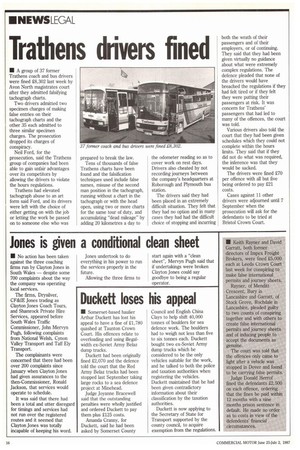Trathens drivers fined
Page 18

If you've noticed an error in this article please click here to report it so we can fix it.
• A group of 37 former Trathens coach and bus drivers were fined £8,302 last week by Avon North magistrates court after they admitted falsifying tachograph charts.
Two drivers admitted two specimen charges of making false entries on their tachograph charts and the other 35 each admitted to three similar specimen charges. The prosecution dropped its charges of conspiracy.
Neil Ford, for the prosecution, said the Trathens group of companies had been able to gain unfair advantages over its competitors by allowing the drivers to violate the hours regulations. Trathens had elevated tachograph abuse to an art form said Ford, and its drivers were left with the choice of either getting on with the job or letting the work be passed on to someone else who was prepared to break the law.
Tens of thousands of false Trathens charts have been found and the falsification techniques used include false names, misuse of the second man position in the tachograph, running without a chart in the tachograph or with the head open, using two or more charts for the same tour of duty, and accumulating "dead mileage" by adding 20 kilometres a day to the odometer reading so as to cover work on rest days. Drivers also cheated by not recording journeys between the company's headquarters at Roborough and Plymouth bus station.
The drivers said they had been placed in an extremely difficult situation. They felt that they had no option and in many cases they had had the difficult choice of stopping and incurring both the wrath of their passengers and of their employers, or of continuing. They said that they had been given virtually no guidance about what were extremely complex regulations. The defence pleaded that none of the drivers would have breathed the regulations if they had felt tired or if they felt they were putting their passengers at risk. It was concern for Trathens' passengers that had led to many of the offences, the court was told.
Various drivers also told the court that they had been given schedules which they could not complete within the hours limits. They said that if they did not do what was required, the inference was that they would be sacked.
The drivers were fined £70 per offence with all but five being ordered to pay £21 costs.
Cases against 11 other drivers were adjourned until 7 September when the prosecution will ask for the defendants to be tried at Bristol Crown Court.




















































































































































